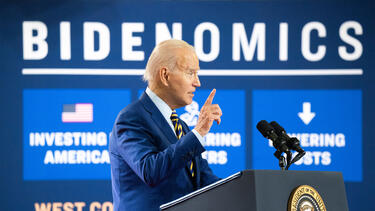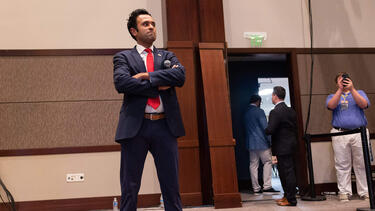Steven Tian
The Israel-Hamas War Reveals the Fundamental Flaws of Social Media
Yale SOM’s Jeffrey Sonnenfeld and Steven Tian write that the viral spread of anti-Semitic and Islamophobic content over the last two months has underlined the failure of social media platforms to control misinformation and hate—and the importance of truth in the face of propaganda.

Dialogue About the Middle East Is Possible—Indeed, It’s the Only Way to Peace
A recent event held at Yale showed that discussions among Israelis, Arabs, and other concerned parties can help bring out points of commonality that may be the first steps on a path toward peace, argue Yale’s Jeffrey Sonnenfeld and Steven Tian.

To Prevent a Wider War in the Middle East, Choke Off Iran’s Oil Sales
Through its proxies, Iran is making aggressive moves against Israel and the U.S. Yale SOM’s Jeffrey Sonnenfeld and Steven Tian write that the U.S. has an option for effective deterrence: cutting off Iran’s oil revenue by strengthening sanctions and imposing a price cap.

The Critics of Bidenomics Are Being Proven Wrong
Yale SOM’s Jeffrey Sonnenfeld and Steven Tian write that much of the credit for the economic good news belongs to President Joe Biden and his transformative public investment programs.

How Putin Cannibalizes the Russian Economy to Fund His War
Yale SOM’s Jeffrey Sonnenfeld and Steven Tian write that the Russian leader is fueling battles in Ukraine by shaking down his own people and leveraging his country’s future.

Meet the Five Schools of Thought Dominating the Conversation about AI
Yale SOM’s Jeffrey Sonnenfeld and Steven Tian and economists Paul Romer and Dirk Bergemann explain the arguments from each camp in the debate over artificial intelligence, from true believers to alarmists.

We Put Aside the Hype and Asked CEOs What They’re Actually Planning for AI
The headlines are full of grand and sometimes terrifying speculation about the potential of artificial intelligence. At Yale SOM’s CEO Summit recently, Prof. Jeffrey Sonnenfeld asked business leaders for some real talk about how their companies are using the technology.

The Business of ‘Anti-Woke’ Is Falling Flat
Yale SOM’s Jeffrey Sonnenfeld and Steven Tian write that the exchange-traded funds that boycott companies taking action on social issues are underperforming the market and struggling to find investors.

It’s Time to Disentangle from China
As the risks of dependence on China become more apparent, a few companies are diversifying their supply chains. But inertia and short-term thinking are keeping many companies tethered to markets and suppliers in the world’s second-largest economy, write Yale SOM’s Jeffrey Sonnenfeld and Steven Tian and investor Kyle Bass.

Why Connecticut’s Investments Are Underperforming
Yale SOM’s Jeffrey Sonnenfeld and Steven Tian and their team found that Connecticut’s return on its pension fund investments is among the worst in the nation. Their analysis of all 50 states offers some avenues for improvement.
